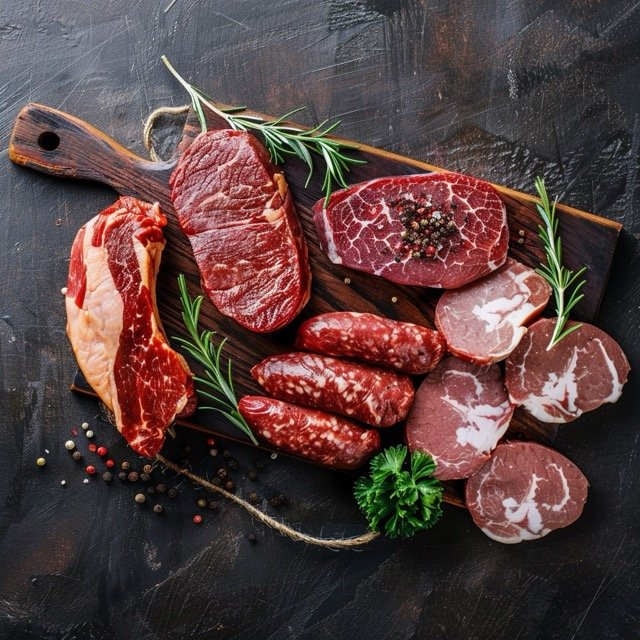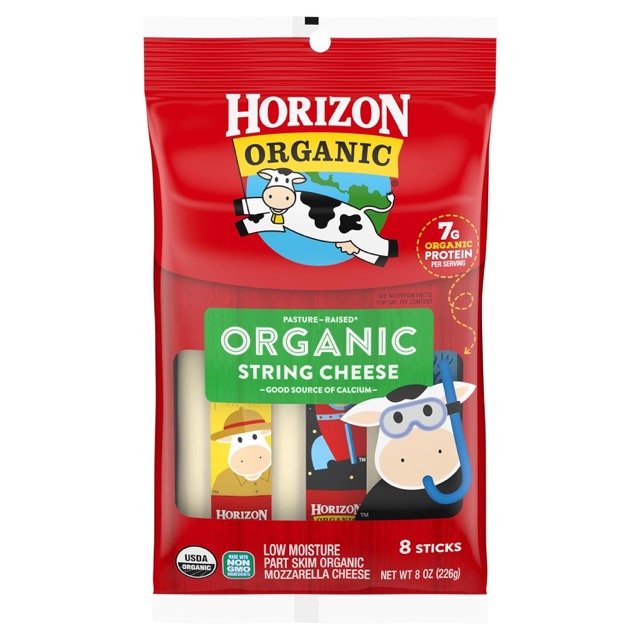The Ultimate Carnivore Diet Food List: What to Eat for Optimal Health
What is the Carnivore Diet?
The carnivore diet is a meat-only diet containing animal-based foods, excluding plant-based foods and other food groups.
Ditch the distractions and get to the good stuff: a restrictive diet strips away the extras, leaving you with the fundamental building blocks like proteins, healthy fats, and vital vitamins found in animal products. Unlike the keto and paleo diets, which allow for small amounts of carbohydrates, the carnivore diet eliminates all food groups except animal products.
By dramatically reducing carbohydrate intake, the keto diet tries to awaken a metabolic state called ketosis, where the body prefers fat over carbs for fuel – a principle shared with the meat-only carnivore diet.
You don’t have to venture far back in time to find that our forebears subsisted on a meat-centric diet – a practice that has left an indelible mark on our modern-day eating habits.
Benefits of the Carnivore Diet
Although no scientific evidence supports this claim, the carnivore diet is famous for its potential as an anti-inflammatory. Certain foods in the carnivore diet, like fatty fish, can promote cardiovascular health due to their omega-3 fatty acid content.
Forget the hype – despite its popularity for shedding pounds, there’s zero scientific proof to back it up. There is a debate around saturated fat; while some studies suggest it can impact cholesterol levels and heart disease risk, proponents of the carnivore diet argue for its benefits. Many consider this diet a fad diet because of the above statements.
Certain diet enthusiasts swear that following this regimen leads to fewer cloudy days, decreased fiery inflammation, and a general sense of feeling more alive.
Carnivore Diet Food List
Beef
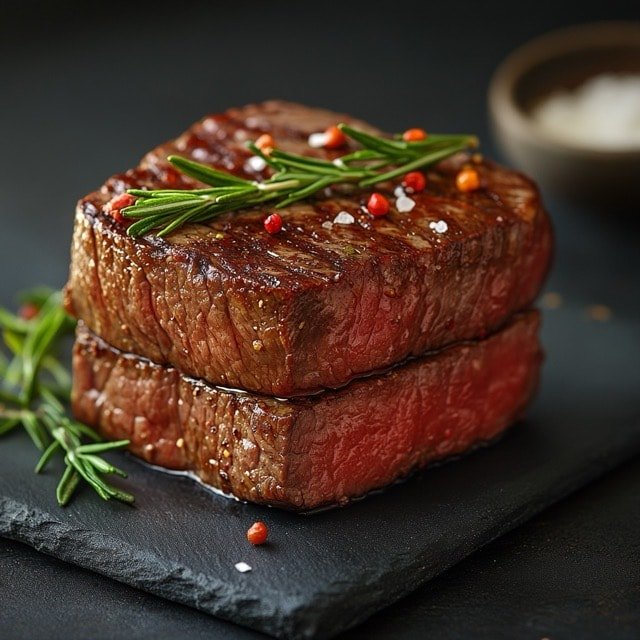
Beef is a central component of the carnivore diet for several reasons:
1. High-quality protein: Beef is an excellent complete protein source, containing all essential amino acids[1][5].
2. Nutrient density: It provides essential nutrients like iron, zinc, selenium, vitamin B12, and vitamin D[6].
3. Satiety: Beef’s high protein and fat content helps promote feelings of fullness, potentially aiding in weight management[3].
4. Zero carbohydrates: Beef aligns with the carnivore diet’s goal of eliminating carbohydrates [5].
5. Versatility: Various cuts of beef offer different flavors and textures, providing variety within the diet’s restrictions[5].
Citations for the Research on Beef:
[1] https://www.bbcgoodfood.com/health/special-diets/what-is-the-carnivore-diet
[2] https://www.pharmacyitk.com.au/pros-and-cons-of-the-carnivore-diet/
[3] https://t-nation.com/t/carnivore-diet-benefits-and-possible-drawbacks/283914
[4] https://www.happystronghealthyrd.com/blog/pros-and-cons-of-the-carnivore-diet
[6] https://www.sciencefocus.com/the-human-body/carnivore-diet-health-impact
Pork
Options for you include smoked Pork Ribs, Pork Chops, Pork Loin Roast, and Pork Tenderloin Medallions.

Pork is included in the carnivore diet for several reasons, offering a variety of nutritional benefits. Here are the key pros of pork meat in the context of a carnivore diet:
1. High-quality protein: Pork is an excellent complete protein source, containing all essential amino acids[2][5].
2. B-vitamins: Pork is particularly rich in thiamine (B1), B6, and B12, which are crucial for energy metabolism, brain function, and blood cell formation[2][5].
3. Minerals: It provides important minerals like zinc, selenium, phosphorus, and iron[5].
4. Energy source: Pork, especially fattier cuts, provides a good amount of fat, the primary energy source in the carnivore diet[4].
5. Cost-effective: Pork is often more affordable than other red meats, making it a budget-friendly option for carnivore dieters.
6. Culinary variety: Pork offers a range of cuts and preparation methods, adding diversity to the carnivore diet[4].
7. Flavor profile: Its distinct taste can provide variety compared to beef or other meats.
8. Exercise performance: Pork contains beta-alanine, which may contribute to improved muscle performance[2].
Citations for the Research on Pork Meat:
[4] https://fitawakening.co.uk/2022/12/07/pork-carnivore-diet/
[8] https://carnivoresnax.com/blogs/articles/best-meat-for-carnivore-diet
Lamb
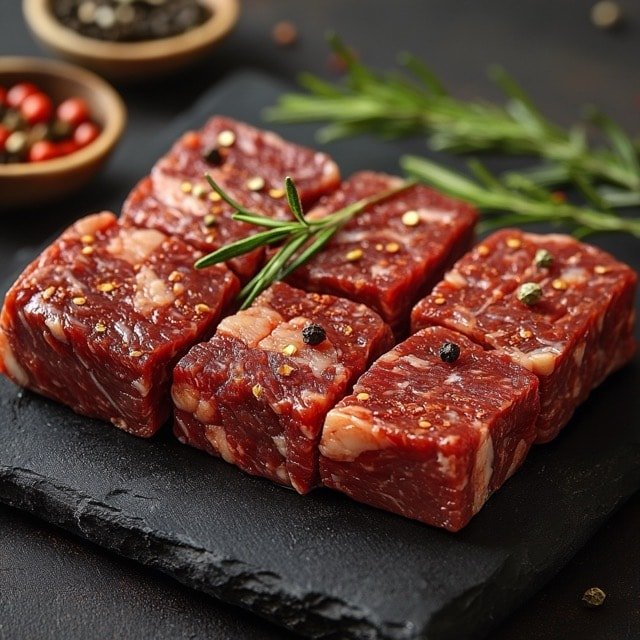
Lamb is integral to the carnivore diet due to its nutritional profile and several health benefits. Here’s an explanation of why lamb is included in the carnivore diet, along with a list of its pros:
High-Quality Protein Source: Lamb is rich in complete protein, containing all nine essential amino acids. A 3-ounce serving provides about 23 grams of protein, nearly 50% of the recommended daily intake[1][2].
Nutrient Density: Lamb contains essential vitamins and minerals, including vitamin B12, iron, zinc, selenium, riboflavin, niacin, and vitamin B6. These nutrients support various bodily functions, from immune health to energy production[4][7].
Heart-Healthy Fats: Lamb contains monounsaturated fats similar to olive oil and avocados. These fats can help reduce harmful cholesterol levels and lower the risk of heart disease[2][6].
Rich in Iron: As red meat, lamb is an excellent source of heme iron, which is more easily absorbed by the body than non-heme iron found in plant sources. This can help prevent iron deficiency and anemia[5][6].
Conjugated Linoleic Acid (CLA): Grass-fed lamb is exceptionally high in CLA, which has been associated with potential fat-burning and anti-inflammatory properties[5][6].
Digestibility: Lamb is often easier to digest than red meats, making it suitable for those with sensitive digestive systems or transitioning to a carnivore diet[8].
Omega-3 Fatty Acids: Grass-fed lamb contains higher levels of omega-3 fatty acids compared to grain-fed lamb, which can contribute to better overall health[6].
Satiety: Lamb’s protein and fat content can help promote feelings of fullness and satisfaction, which is beneficial for weight management[7][8].
Versatility: Lamb can be prepared in various ways, offering diversity in meals while adhering to the carnivore diet[8].
No Added Hormones: American lamb production does not use growth hormones, which may appeal to health-conscious consumers[7].
Citations for Lamb Meat Research:
[2] https://wholey.com/resources/healthy-eating/surprising-health-benefits-of-lamb/
[3] https://www.webmd.com/diet/what-to-know-about-lamb-nutrition
[6] https://nzspringlamb.com/top-5-reasons-to-add-new-zealand-spring-lamb-to-your-diet/
[7] https://americanlamb.com/news/10-nutritional-reasons-to-eat-american-lamb/
Turkey

Turkey is an integral part of the carnivore diet due to its nutritional profile and alignment with its principles. Here are the reasons why turkey is included and the pros of turkey meat:
High-Quality Protein Source: Turkey is an excellent source of lean protein, providing about 25 grams per 3-ounce serving[4].
Low in Fat: Turkey, especially when skinless, is low in fat compared to other meats.
Rich in Nutrients:
1. B Vitamins: Turkey is rich in niacin (61% DV), vitamin B6 (49% DV), and vitamin B12 (29% DV), which are essential for energy production and metabolic functions[1][4].
2. Selenium: Turkey provides 46% of the daily value for selenium, an important antioxidant that supports thyroid function and boosts immunity[1][3].
3. Zinc: With 12% of the daily value, turkey contributes to immune system support[1].
4. Phosphorus: Turkey contains 28% of the daily value for phosphorus, which is vital for bone health[1].
Heart Health: Turkey’s lean protein may help improve heart health by regulating blood pressure and potentially increasing “good” HDL cholesterol levels[4].
Weight Management: Turkey is a low-calorie, high-protein food that can help manage weight and promote feelings of fullness[2].
Blood Sugar Control: Turkey has a low glycemic index, which can help manage blood sugar levels, which is particularly beneficial for those with diabetes[4].
Cognitive Health: Consuming turkey as part of a balanced diet may protect against cognitive decline[4].
Citations for Research on Turkey Meat:
[2] https://hillsideturkey.com/5-exciting-health-benefits-of-turkey/
[5] https://discover.texasrealfood.com/carnivore-diet/turkey-nutritional-value-carnivore-diet
Chicken

Chicken is included in the carnivore diet because it’s an animal-based food that aligns with the diet’s core principle of consuming only animal products. Here are some of the key benefits of chicken meat in the context of a carnivore diet:
High-Quality Protein: Chicken is an excellent source of high-quality protein, containing all nine essential amino acids[1][2].
Low in Fat: Chicken, especially breast meat, is relatively low in fat compared to other meats, making it a leaner protein option for those following a carnivore diet[1][2].
Rich in Vitamins and Minerals:
Vitamin B12: Promotes brain development, nervous system function, and cognitive performance[1][3]
Niacin (Vitamin B3): Supports energy production and DNA synthesis[4]
Selenium: An antioxidant that supports immune function[4]
Phosphorus: Important for bone health[4]
Zinc: Supports immune function and wound healing[4]
Versatility: Chicken is easy to prepare in various ways (grilled, baked, or stir-fried), making it a convenient option for those following a restrictive diet[2].
Weight Management: Chicken’s high protein content can help promote feelings of fullness, potentially aiding in weight management[2][4].
Bone Health: Chicken protein may contribute to maintaining bone mineral density, potentially reducing the risk of osteoporosis[2][4].
Citations for Research on Chicken Meat:
[1] https://www.chickencheck.in/faq/chicken-health-benefits/
[3] https://www.chickencheck.in/blog/5-nutritional-chicken-benefits/
[4] https://www.healthline.com/nutrition/is-chicken-good-for-you
[5] https://www.health.harvard.edu/nutrition/what-is-the-carnivore-diet
Salmon
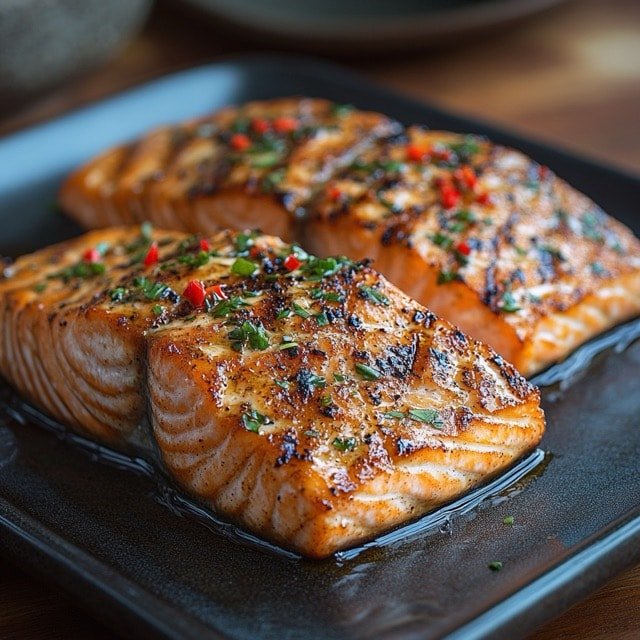
Salmon is often included in the carnivore diet due to its high nutritional value and numerous health benefits. Here’s an explanation of why salmon is a part of the carnivore diet and a list of the pros of salmon meat:
1. Excellent Source of Protein: Salmon is rich in high-quality protein, providing 22-25 grams per 3.5-ounce (100-gram) serving[1].
2. Rich in Omega-3 Fatty Acids: Salmon is one of the best sources of omega-3 fatty acids, particularly EPA and DHA[1]. These essential fats offer numerous health benefits, including:
Promoting heart health
Reducing inflammation
Supporting brain function and cognitive health
Aiding in joint health and reducing arthritis symptoms[1][3]
3. High in B Vitamins: Salmon is an excellent source of B vitamins, including Vitamin B12, Niacin, Vitamin B6, Riboflavin, Pantothenic acid, and Thiamine. These vitamins are crucial in energy production, DNA repair, and nervous system function[1].
4. Rich in Selenium: Selenium is essential in DNA synthesis, thyroid hormone metabolism, and reproductive health[1].
5. Good Source of Potassium: Salmon, especially wild salmon, is high in potassium, helps manage blood pressure, and may reduce the risk of stroke[1].
6. Contains Astaxanthin: Salmon’s pinkish-orange color comes from astaxanthin, a powerful antioxidant that may help prevent several diseases, including neurodegenerative, cardiovascular, and inflammatory [2].
7. Supports Bone Health: Salmon is an excellent source of vitamin D and calcium, both essential for maintaining healthy bones[2][3].
Citations for Research on Salmon Meat:
[1] https://www.healthline.com/nutrition/salmon-nutrition-and-health-benefits
[3] https://share.upmc.com/2023/04/health-benefits-of-salmon/
[5] https://www.nutritionwithjudy.com/should-seafood-be-a-part-of-my-carnivore-diet
Tuna

Tuna is included in the carnivore diet because, as a seafood option, it offers a convenient and widely available source of nutrients that support its goals [3].
High-Quality Protein: Tuna is an excellent source of lean protein, providing about 26.77 grams of protein in a 4-ounce serving[1].
Rich in Omega-3 Fatty Acids: Tuna contains omega-3 fatty acids, particularly DHA and EPA[4]. These essential fats are associated with numerous health benefits, including:
Low in Calories: Despite its high protein content, tuna is relatively low in calories. A 4-ounce serving contains only about 145 calories, making it an excellent choice for those looking to maintain or lose weight[1][3].
Tuna is a rich source of several essential vitamins and minerals:
– Vitamin D: Tuna is one of the best dietary sources of vitamin D, crucial for bone health and immune system function[1][4].
– Vitamin B12: Essential for DNA production and preventing anemia[1][4].
– Selenium: A powerful antioxidant that supports immune function and thyroid health[4].
– B Vitamins: Including niacin and B6, which support energy metabolism and may help reduce the risk of heart disease and dementia[4].
Convenience: Canned tuna is a practical and easily accessible option for those following the carnivore diet. It requires no preparation and can be consumed directly, making it an ideal choice for quick meals or snacks[3][7].
Versatility: Tuna can be prepared in various ways, including grilled, baked, or sautéed, allowing for diversity in meals while adhering to the carnivore diet principles[1][3].
Citations for Research on Tuna fish:
[3] https://discover.texasrealfood.com/carnivore-diet/canned-tuna-on-carnivore-diet
[4] https://starkist.com/healthy-article/health-benefits-of-tuna/
[5] https://discover.texasrealfood.com/carnivore-diet/is-fish-allowed-on-carnivore-diet
[7] https://chomps.com/blogs/nutrition-sustainability-news/carnivore-diet-snacks
Mackerel

Mackerel is a valuable part of the carnivore diet due to its high nutritional content and numerous health benefits. Here’s an explanation of why mackerel is included in the carnivore diet, along with a list of its pros:
1. High in Omega-3 Fatty Acids: Mackerel is an excellent source of omega-3s, which are crucial for heart and brain health[1][3].
2. Protein-Rich: With about 20 grams of protein per serving, mackerel supports muscle growth and repair[2].
3. Vitamin D Source: Mackerel is one of the best natural sources of vitamin D, essential for bone health and immune function[2][3].
4. Heart Health: Regular consumption may help lower blood pressure and cholesterol [2][3].
5. Brain Health: The omega-3s in mackerel may help prevent brain disorders and improve cognitive function[3].
6. Weight Management: The high protein and healthy fat content can increase satiety and support weight loss efforts[2][3].
7. Bone Strength: Rich in vitamin D, calcium, and other minerals, mackerel contributes to bone health[2][3].
8. Skin and Hair Health: The nutrients in mackerel may improve skin condition and hair luster[1].
9. Immune System Support: Contains compounds that may strengthen the immune system[1].
10. Rich in Minerals: Provides essential minerals like selenium, magnesium, and iodine[2][3].
11. Low in Mercury: Compared to some other fish, mackerel generally has lower levels of mercury, making it a safer choice for regular consumption[5].
12. Versatile and Flavorful: Mackerel can be prepared in various ways and has a rich, distinctive flavor many enjoy[2].
Citations for Research on Mackerel Fish:
Shrimp
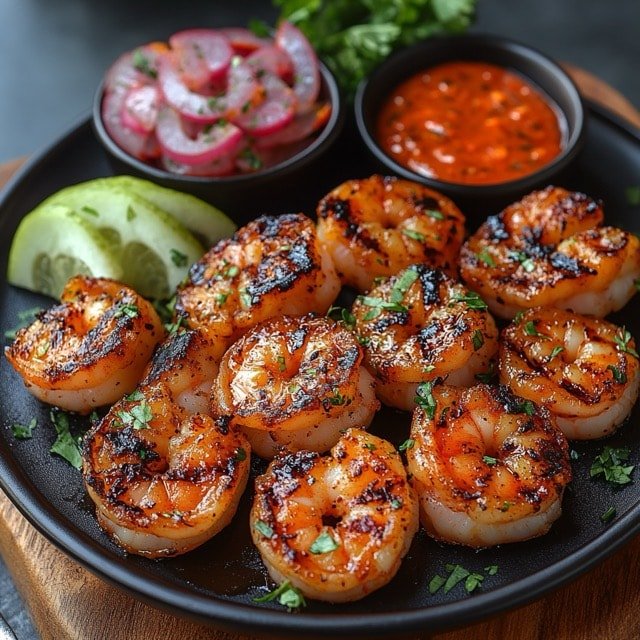
Shrimp is often included in the carnivore diet due to its nutritional profile and alignment with its principles. Here’s an explanation of why shrimp is part of the carnivore diet, along with a list of its pros:
High-Quality Protein Source: Shrimp is an excellent source of protein, containing about 20.4 grams of protein per 3-ounce serving[1].
Low in Calories: Shrimp is a low-calorie protein option, with only 84.2 calories per 3-ounce serving [1].
Rich in Nutrients:
Shrimp provides a variety of nutrients, including:
– Iodine: Important for thyroid function and brain health[3]
– Selenium: An antioxidant that may help prevent certain types of cancer[2]
– Zinc: Supports immune function and wound healing[1]
– Magnesium: Beneficial for blood pressure and bone health[1]
– Phosphorus: Necessary for balancing mineral intake[1]
Omega-3 Fatty Acids: Shrimp contains omega-3 fatty acids associated with heart health benefits and may help reduce the risk of cardiovascular diseases[1][3].
Antioxidants: Shrimp contains astaxanthin, a powerful antioxidant that may help protect cells against damage and has been linked to various health benefits, including improved brain and heart health[3].
Zero Carbohydrates: Shrimp contains no carbohydrates, which aligns perfectly with the carnivore diet’s goal of eliminating plant-based foods and carbohydrates[1].
Versatility: Shrimp can be prepared in various ways, such as boiling, steaming, grilling, or sautéing, making it a versatile option for carnivore dieters[2].
Supports Thyroid Function: Shrimp contain iodine and selenium, which are beneficial for thyroid function and are crucial for maintaining a healthy metabolism[1].
Citations for Research on Shrimp:
[1] https://www.aqualv.com/seafood-101/health-benefits-of-shrimp/
[2] https://www.webmd.com/food-recipes/shrimp-health-benefits
[5] https://www.eatingwell.com/article/7913653/is-shrimp-healthy/
Lobster

Lobster is considered a part of the carnivore diet due to its animal-based origin and high nutritional value. Here are the pros of including lobster in a carnivore diet:
High-Quality Protein: Lobster is an excellent source of protein, providing about 17 grams per 3-ounce serving[1]. This makes it ideal for muscle building and maintenance, a key focus of the carnivore diet[6].
Low in Saturated Fat: Unlike some other animal proteins, lobster is low in saturated fat[4]. This makes it a heart-healthy option for those following a carnivore diet, as it can help maintain healthy cholesterol levels.
Rich in Omega-3 Fatty Acids: Lobster contains omega-3 fatty acids, which are essential for heart health, cognitive function, and reducing inflammation[1][2]. While not as high in omega-3s as some fish, lobster still contributes to the intake of these important nutrients.
Lobster is packed with essential vitamins and minerals:
Vitamin B12: Supports nerve function and red blood cell formation[4]
Selenium: Acts as an antioxidant and supports thyroid health[2]
Zinc: Important for immune function and wound healing[4]
Copper: Aids in iron absorption and supports bone health[2]
Low in Calories: With only about 96 calories per 3-ounce serving, lobster is a low-calorie protein option[1].
Citations for Research on Lobster:
[1] https://www.wholesalemainelobster.com/blog/5-incredible-lobster-health-benefits/
[3] https://www.costasinn.com/blog/five-health-benefits-of-eating-lobster/
[4] https://www.webmd.com/diet/are-there-health-benefits-of-lobster
[5] https://www.nutritionwithjudy.com/should-seafood-be-a-part-of-my-carnivore-diet
[7] https://www.capeporpoiselobster.com/health-benefits-of-eating-lobster/
[8] https://www.eatingwell.com/article/7913555/is-lobster-healthy/
Crab

Crab offers numerous health benefits due to its rich nutritional profile:
High in Protein: Crab is a low-fat source of protein, providing about 19.35 grams per 100-gram serving, comparable to other meats but with less saturated fat[2][4]. This makes it an excellent choice for those looking to increase their protein intake without consuming excessive calories.
Rich in Omega-3 Fatty Acids: These essential fats are known for their heart health benefits, including lowering cholesterol levels and reducing the risk of heart attacks and strokes[1][2].
Boosts Immune System: Crab is high in nutrients like zinc, selenium, and vitamin B12, which support a strong immune system and help protect against infections and diseases[1][3].
Supports Brain Health: The omega-3 fatty acids, along with other nutrients found in crab, such as selenium and vitamin B12, contribute to improved cognitive function and may reduce the risk of dementia[2][3].
Promotes Bone Health: Crab meat is a good phosphorus source, essential for maintaining healthy bones and teeth[2].
Low in Fat: With only about 0.2% fat per 100-gram serving, crab is a low-calorie protein source that can help maintain energy levels and support weight management[1][4].
High in Selenium: This mineral acts as an antioxidant, protecting cells from damage by free radicals and supporting thyroid function[4].
Citations for Research on Crab:
[1] https://www.summershackrestaurant.com/news-item/health-benefits-of-eating-crab/
[2] https://www.dc-steakhouse.com/blog/health-benefits-of-eating-crab
Sardines

Sardines offer numerous health benefits, making them a valuable addition to any diet, including the carnivore diet:
Rich in Omega-3 Fatty Acids: Sardines are an excellent source of omega-3 fatty acids, which are known for their heart-protective properties. These fats help reduce inflammation and may lower the risk of heart disease[1][2].
High in Protein: Sardines provide a complete source of protein, containing all essential amino acids necessary for muscle growth and repair[1][2].
Bone Health: Sardines are rich in calcium and vitamin D, which are crucial for maintaining strong bones. Eating sardines, including their bones, can significantly contribute to daily calcium intake[1][2].
Brain Health: Sardines contain omega-3s that support brain health and may reduce the risk of cognitive decline[1][2].
Blood Sugar Regulation: Sardines contain no carbohydrates, making them suitable for managing blood sugar levels and potentially preventing type 2 diabetes[1].
Nutrient-Dense: Besides omega-3s and protein, sardines contain essential vitamins and minerals, such as vitamin B12, selenium, phosphorus, and iron, which support various bodily functions[2].
Citations for Research on Sardines:
Bone broth
Bone Broth is a nutrient-dense liquid derived from bones and connective tissues. It is rich in amino acids, collagen, and minerals and serves as a nourishing beverage in the carnivore diet.
Organ Meats
Due to their concentrated nutrient profiles, organ meats are considered highly nutritious and beneficial for a carnivore diet.
The liver, heart, and kidneys are all options, offering high-quality proteins and various vitamins and minerals.
Beef and pork brain is a source of omega-3 fatty acids and nutrients like choline.
Processed Meats and Dairy
Processed meats can be included in moderation, offering a convenient and flavorful option.
Bacon, sausages, pepperoni, salami, and jerky are options, but it is important to select products without added sugars or fillers.
Eggs and dairy products can serve as valuable animal-based protein and fat sources.
Rich in saturated fats, butter can be used for various cooking techniques and to enhance flavors.
Fats and Oils
Fats and oils are crucial for energy and satiety on a carnivore diet.
Tallow, lard, and duck fat are animal-based fats that can be used for cooking and roasting.
Olive oil is a widely available option used in moderation for cooking.
Nutritional Considerations and Micronutrients
Critics of the carnivore diet often point out that it may not provide adequate vitamins C and E, usually plentiful in fruits, vegetables, and whole grains.
Detractors of the carnivore diet argue that without fruits and veggies, fans of the meat-only approach may find themselves starving for vital nutrients. Pushing back, advocates for the carnivore diet argue that animals are a sufficient source of nutrients for achieving top-notch health.
For instance, while vitamin C is commonly associated with citrus fruits, it is also present in animal foods like liver and fish roe, albeit in smaller amounts. Additionally, the reduced intake of carbohydrates on a carnivore diet may lower the body’s requirement for vitamin C.
Vitamin E gets a bad rap for being a bit boring. Still, this underdog is a powerhouse when it comes to cell protection. Rich in antioxidant properties, it is especially high in the animal fats of grass-fed animals—think locally sourced eggs and beef from happy cows.
Organ meats boost carnivore diets, providing essential vitamins and minerals our bodies crave. This food megastar practically overflows with goodness, boasting heaping helpings of vitamin A, an array of B vitamins, and generous servings of iron and copper. Including a mix of meats and organ meats in their diet provides followers with a comprehensive lineup of vital nutrients.
While the debate continues, it’s clear that the carnivore diet can be nutritionally sufficient with thoughtful planning and a focus on nutrient-rich animal products. Before you revamp your diet, get a thumbs-up from a healthcare pro – it’s just common sense.
Implementing the Carnivore Diet
Meal Planning and Preparation
Planning your carnivore diet meals just got easier! Here’s a simple carnivore diet meal plan based on delicious recipes that emphasize convenience and flavor, helping you maintain adherence to the diet even with a busy schedule.
Make your trip to the store effortless with a carnivore diet shopping list.
Consider incorporating Ancestral supplements, such as liver supplements, to provide a convenient way to address potential gaps in your diet.
Sourcing Carnivore Diet Foods
Finding premium animal products for your carnivore diet is easier than you might think.
If you’re looking for top-quality animal products, your local butcher is the place to go. They’ll even give you the lowdown on scoring great deals on large orders.
Chances are your local farmers’ market is hiding a treasure trove of premium animal products just waiting to be discovered. These community-driven hubs offer unparalleled variety and quality from heirloom-breed eggs to antibiotic-free organ meats and truly indulgent grass-fed dairy products.
You can score premium meat from trusted sources like Butcher Box from the comfort of your own home.
Common Questions and Concerns
Isn’t it unhealthy to exclude vegetables? The concern about skipping veggies is valid, as vegetables are rich in vitamins and fiber.
However, the carnivore diet obtains nutrients from animal products, which provide complete proteins, healthy fats, and essential vitamins.
Nutrient shortfalls – what’s the impact? A common worry revolves around potential nutrient deficiencies.
However, when executed thoughtfully, the carnivore diet can be nutritionally sufficient.
Forget about eating the same old thing every day – varying your meat intake packs a nutritional punch.
Conclusion
One rule governs the carnivore diet: animals provide the ammunition, meeting our bodies’ deep-seated needs for growth, energy, and renewal.
Some people may find this beneficial, but others – particularly those with specific health concerns – should exercise caution.
Before diving into the carnivore diet, take a step back and schedule a consultation with a healthcare pro – it’s the smart move.
For those willing to put in the work, a carnivore diet can be a powerful tool for rejuvenating health and enhancing daily life – it just takes a bit of strategy and elbow grease.


